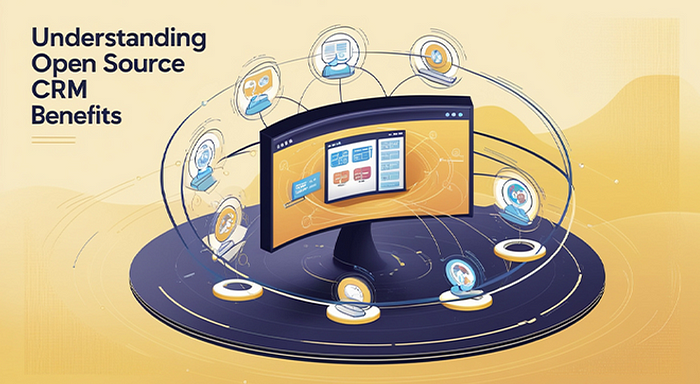Understanding Open Source CRM, Benefits, Impact on Business Process

In the current world, organizations are adopting efficient use of technology, especially in handling customer relations. One of the strategic assets in this process is the Customer Relationship Management or CRM application. This has made open-source CRM platforms a highly flexible, cost-effective addition to every business large or small.
In this blog, we’ll know what open-source CRM is, why a business ought to use it, and how this idea can change the Face of business processes.
What is Open Source CRM?
Open source CRM is CRM software in which source code is accessible to everyone. Whereas proprietary CRM systems are developed and offered by software companies, open-source CRM systems are developed by communities with the ability to be changed by users. This makes it easier for businesses to adapt the software in a way that meets all their needs and matches their activity.
Many open-source CRM solutions have a set of applications that allow controlling interactions with customers, selling, marketing, and providing services. Some examples of open-source CRM systems are SuiteCRM, Odoo, and Vtiger. These are the platforms that provide essentials for businesses to implement individual approaches to CRM with no need to invest millions in licensed software.
Benefits of Open Source CRM
1. Cost-Effectiveness:
Still, probably the greatest strength of open-source CRM is it is more affordable in price when compared to commercial systems. Several open-source CRMs are available for download for free, and this costs businesses a lot of money compared to proprietary licensing fees.
2. Customization and Flexibility:
A widely known fact is that open-source CRMs provide great flexibility. Organizations can customize it to fit some procedures and embed the software in currently used systems. It means that CRM is adjusted to the organization’s dynamics and changes over time.
3. Community Support and Collaboration:
Software that is open source usually has a large following and users which include developers. This community is used for idea sharing, support, and contributing to the further enhancement of the said software. It is in this climate that good ideas are generated, and solutions made quickly.
4. Transparency and Security:
As with CRM from the open-source platform, the source code of the software is available to the public and other organizations can be audited for security loopholes. This transparency can lead to enhanced security since users can patch problems quickly or choose from a range of community-shared solutions.
5. Avoiding Vendor Lock-in:
In open-source CRM, businesses are not stuck with a specific vendor when it comes to software support or the next release. The choice of adjusting and hosting the CRM in whatever manner possible removes the dependence on lone service providers and offers organizations enhanced control over the CRM techniques.
How Open Source CRM Changes Business Processes?
Open-source CRM offered a new method of communication with the buyer. In addition, centralizing data and rationalizing interaction improves the satisfaction of customers and optimizes work outcomes. For example, sales teams obtain insights into customers’ behavior to enable them to approach the customers and make necessary adjustments in sales accordingly. A study shows that the marketing departments can automate the campaigns and monitor their impact on the result to improve the strategies and overall effectiveness of the campaigns as well as the return on investment.
In addition, open-source CRM has the advantage of expatriation. Moreover, a CRM can be tailor-made to suit the growing needs of a business and manage higher amounts of data and processing within the system. Taking into account that it is frequently possible to integrate third-party applications with open-source CRM, the system performs the role of an essential center in the business technically considered.
Conclusion
Knowing what is CRM, we can conclude open-source CRM provides a sound, elastic, and affordable tool for businesses to improve their customer relation management. Open source CRM provides full control over customization, and full transparency, and stimulates the community to innovate, thus it brings organizations perfectly suited solutions.
For businesses that are inspired to get that competitive advantage, it might be the right time to look at open-source CRM as an avenue they need to explore to get better levels of efficiency and customer satisfaction.